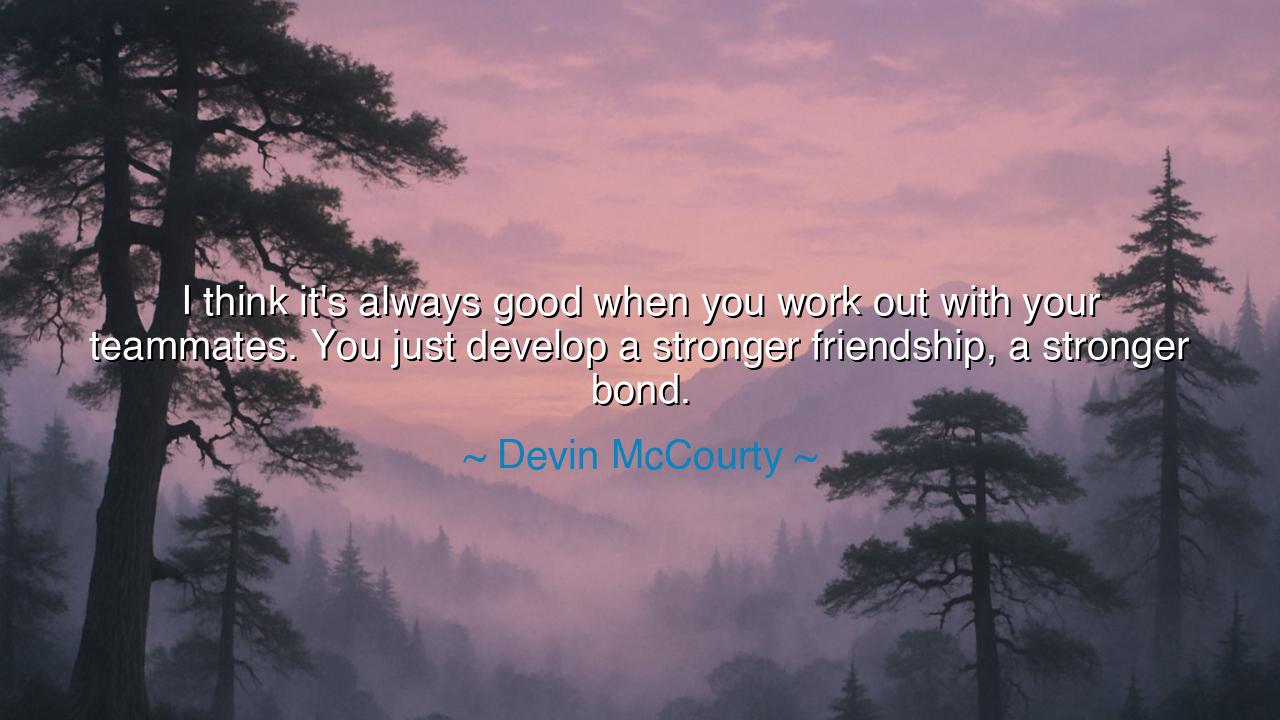
I think it's always good when you work out with your teammates.
I think it's always good when you work out with your teammates. You just develop a stronger friendship, a stronger bond.






In the timeless pursuit of strength, both in body and spirit, there is a profound truth that Devin McCourty captures in his words: "I think it's always good when you work out with your teammates. You just develop a stronger friendship, a stronger bond." Here, McCourty speaks not only of the physical act of working out together but of the deeper, invisible forces at play—the friendship, the trust, and the solidarity that form when individuals come together with a shared goal. To train alongside one another, to struggle and to strive toward a common end, is to forge a bond that goes beyond mere professional collaboration. It becomes a connection, a fellowship born of mutual effort, sweat, and shared experience. In such a bond, each person becomes not just a teammate, but a companion, a brother or sister in the truest sense of the word.
The ancient Greeks understood the power of shared effort in building community and friendship. The Olympic Games, in their earliest form, were not just a contest of physical prowess, but a celebration of the bonds that athletes formed through their shared training, suffering, and triumphs. The Greek concept of philia, or friendship, was seen as one of the highest forms of human connection, not based on fleeting pleasure or self-interest, but on shared values and mutual respect. For the Greeks, to train together, to prepare for battle or competition as a unified force, was to strengthen not just the body but the very soul of the group. The bond forged in the crucible of competition was considered sacred—something that elevated the spirit and connected individuals to one another in ways that transcended the superficial.
In the Roman world, the importance of working together for a common cause was similarly celebrated. Cicero, that great philosopher and statesman, wrote extensively on the nature of friendship. For Cicero, true friendship was rooted in shared effort—whether in personal matters or public service. He believed that the best friendships were those that were built in the fire of adversity and collaboration. Much like McCourty’s words, Cicero saw the development of strong friendships as a byproduct of working together toward a goal, especially when that goal required sacrifice, effort, and the willingness to put the collective above the individual. It was not in ease or comfort that the deepest bonds were formed, but in the shared struggle, the unity forged through hard work.
Consider the relationship between Alexander the Great and his closest companions—his generals and soldiers who fought beside him through countless battles. Their bond was not just one of duty, but of shared experience, forged in the heat of battle and the trials of war. The bonds they developed as they worked together toward the same goal—conquering new lands and spreading their ideals—were deep, rooted in mutual respect and the shared experience of hardship. Alexander’s ability to inspire such loyalty and camaraderie in his men speaks to the timeless truth that when individuals work together with a common purpose, they do not only grow in skill but in solidarity, forming friendships that can withstand the fiercest storms.
This principle of shared effort leading to stronger bonds is evident not only in battle or athletic pursuits but in the everyday struggles of life. The bond between David and Jonathan, two of the most revered figures in biblical history, is a testament to this. Though Jonathan was the son of King Saul, a man who sought to harm David, their bond was one of the purest friendships in history. It was their shared struggles, their efforts to support one another in the face of adversity, that created a bond stronger than any political allegiance or familial duty. Jonathan’s willingness to protect David, even at the expense of his own future as heir to the throne, exemplifies the selflessness and loyalty that arise when individuals work together in unity and trust.
The lesson we learn from McCourty’s words is clear: shared effort is a powerful force in forging deep, lasting friendships. Whether in the pursuit of athletic excellence, career goals, or personal development, working together toward a common objective creates bonds that transcend mere professional connections. These friendships, built on mutual respect, trust, and sacrifice, are the ones that endure, those that offer strength and support when we need it most. True friendship, as McCourty suggests, is not just about shared successes, but about the journey—the trials and triumphs we face together.
So, in your own life, seek out opportunities to work alongside others toward a shared goal, whether in work, sports, or personal endeavors. Embrace the struggles and hardships that come with working in a team, for it is through these challenges that the deepest and most meaningful connections are formed. Remember that friendship is not just about shared enjoyment, but about the trust and solidarity forged through shared effort and common purpose. And in this shared journey, you will find not only success but the kind of friendships that can stand the test of time—strong, enduring, and built to last.






AAdministratorAdministrator
Welcome, honored guests. Please leave a comment, we will respond soon